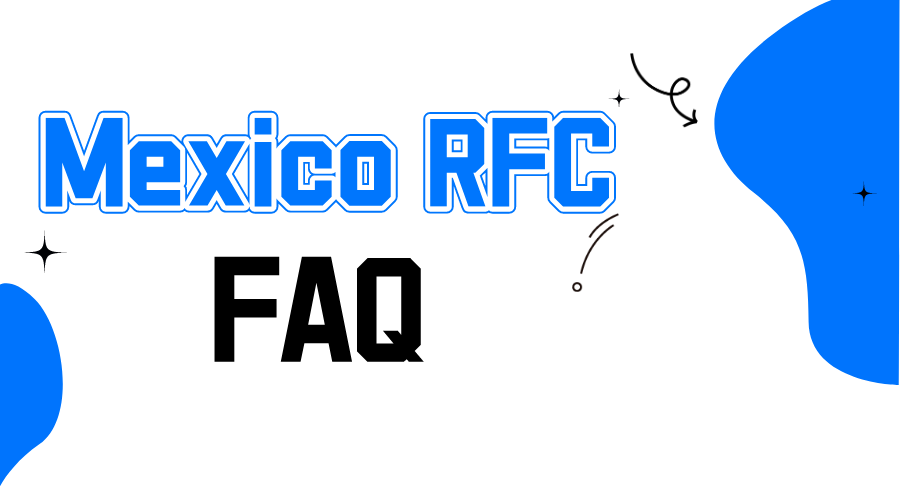Mexico RFC FAQ

What is RFC?
RFC- Registro Federal de Contribuyentes, which is a business's registration number with the Mexican government, equivalent to a tax registration number.
Therefore, the RFC tax number cannot be completely equated with the familiar VAT number in Europe. Instead, the RFC tax number should be better understood as a tax identification number. In Mexico, all taxable subjects are identified by the RFC tax number to pay tax at the tax bureau.
Who needs to register a Mexican RFC tax number?
Anyone who meets one of the following requirements has the obligation to register an RFC number:
① Warehouse in Mexico (either FBA or overseas)
② There are registered companies in Mexico
③ Mexican citizens
④ Aliens with legal residency in Mexico
This means that sellers with an FBA in Mexico or a local offshore warehouse need to register an RFC tax number; Customers whose inventory is sold remotely from North American warehouses and mailed directly from China or the United States to buyers in Mexico do not have to register for RFCS.
The application process of RFC tax number
First of all, an overseas enterprise applying for a tax number in Mexico must have a local financial representative, and the representative should provide a fixed address to the overseas seller. This policy is similar to that of Spain, France and Italy in Europe. The representative not only needs to be authorized by the seller to handle the local tax affairs in Mexico, but also needs to assume joint and several liability for the tax.
After finding the local representative, the representative needs to be authorized, the letter of authorization and company materials must be authenticated by the Hague, in order to be recognized by the Mexican tax bureau.
The complete Hague certification also needs to be translated and notarized locally in Mexico before being sent to the Mexican Ministry of Economy for approval. The last step is to make an appointment with the tax bureau for an interview. The financial representative of Mexico will personally go to the tax bureau with all the relevant materials and apply to the tax bureau officials face to face. The result will be made on the same day whether the registration is OK or not.
Once you get the RFC, you need to apply for an electronic signature, which is like a key, a login password to file taxes. This signature is managed by a Mexican financial representative.
Mexico's filing period
Mexico's VAT declaration is based on the final selling price on a monthly basis. The monthly deadline for filing is fixed, which is the 17th day of the month following the month of filing. Sales in December, for example, must be declared by January 17.
Rate
VAT is payable at the general rate of 16% on sales of goods and services, as well as on lease payments and imports of goods and services. The principal VAT-exempt transactions are the sale of land, credit instruments (including equity shares), residential construction, interest paid by banks, medical services, education, salaries and wages, rentals of residential property, and the sale of non-amortisable participation certificates on real estate investment trusts (REITs), provided specific requirements are satisfied.
The 0% VAT rate, which generally means that no VAT is payable, is applicable to a substantial number of transactions, including the sale of books, magazines, and newspapers published by the taxpayer, the exportation of goods and certain services (including some Maquiladora activities intended for exportation), the sale of certain basic foodstuffs, the sale of medicines, agricultural goods and services, sales and rentals of farm M&E, and other specified transactions.
The Mexican government has granted duty-free treatment to a range of basic necessities from May 17, 2022, in a bid to mitigate the impact of rising prices on domestic consumers. These include corn oil, rice, tuna, pork, chicken, beef, Onions, jalapeno peppers, beans, corn flour, wheat flour, eggs, soap, tomatoes, milk, lemons, white corn, apples, oranges, certain breads, potatoes, soup noodles, sardines, sorghum, wheat and carrots.
Tax payment
Mexico's tax payment method is different from the familiar European countries, after the accountant submits the declaration, the Mexican tax bureau will produce a declaration report. The report is also the basis for paying taxes.
A minefield of late tax payments
There will be a thunder point in the tax payment process. If the seller does not declare until the 17th, but can not pay until after the declaration, will the seller make the payment in time?
In fact, since the payment deadline after Mexico's declaration is not fixed, there is a possibility that the declaration will be made on the 17th and the deadline will be set on the 18th. In this case, it will be very unfriendly to foreign companies. We all know that the international remittance can not arrive within 1 day, so I suggest that all the sellers must declare as soon as possible, and pay the full amount of funds prepared in advance on the platform account.
Mexican fine
What happens if payment is indeed not made by the due date? First of all, the payment serial number on the aforementioned declaration report will expire, and you need to notify the local accountant to apply for the declaration report and payment serial number again from the tax bureau.
Under the new payment serial number, there will be a new payment deadline, usually one month later (the date is also variable). The report will also be accompanied by a fine, which is usually about 1.5 percent of the tax and is set by the tax bureau. After receiving the new report, the seller shall pay the total amount of tax and penalty before the new due date.
Finally, please note that the tax payment is based on the time to the tax bureau account to consider whether there will be a penalty, not the date of remittance. Because there is extra time for international transfers, the tax bureau only recognizes the date the tax is due.
Can the seller without RFC create FBA shipment?
Since May 2022, Amazon has strengthened the verification policy of sellers' RFC. For new sellers in Mexico site, if the seller has not obtained a valid RFC tax number or has not obtained a valid RFC tax number but has not submitted it to the seller platform for verification, the goods cannot be created.
If a seller with storage in Mexico does not provide a tax number before May 2022, Amazon will withhold both value-added and income taxes based on their monthly sales.
Since e-commerce platforms need to bear common tax responsibilities, Amazon will strictly control the authenticity and validity of Mexican RFCS and the authenticity of VAT tax declaration.
Does applying for a Mexican Departure tax number save just 20% on income tax?
- Enterprise Seller:
If you do not upload your Mexican Tax Registration number (RFC ID), Amazon will withhold 20% income tax and 16% VAT.
After the RFC ID is uploaded and verified, income tax and VAT will not be paid.
- Individual Sellers:
If no RFC is uploaded, Amazon will withhold 20% income tax and 16% VAT.
After the RFC is uploaded and verified, from January 1, 2021, Amazon will withhold 1% income tax and 8% VAT (50% of the standard rate) on the total sales for the month.
From June 1, 2020 to December 31, 2020, Amazon will withhold income tax from 0.4% to 5.41% of total sales for the month, plus VAT of 8% (50% of the standard rate).
And after registering the RFC tax number, the seller will have the right to declare normally and deduct the input tax. Usually, the invoices of Amazon logistics expenses, storage fees, advertising service fees and recommendation fees generated by customers contain VAT, and VAT can be used to deduct taxes in the later declaration, which is also a significant amount, accounting for 5%-7% of the sales.
That is, in the case of compliance, non-local Mexican sellers find a professional tax agent registered RFCS, the VAT payable is only about 9-12%.
Amazon cannot refund the amount withheld before submitting the RFC ID.
Mexico Electronic Invoice 4.0
In order to make it easier for taxpayers to fulfill their tax obligations, the Servicio de Administracion Tributaria (SAT) has announced that the new electronic invoice version CFDI4.0 will be mandatory from April 1, 2023. That is, all taxpayers must use the new CFDI 4.0 for electronic invoicing, with version 3.3 available until March 31, 2023.
At the same time, taxpayers should timely update their tax information in the tax system, such as:
- RFC registration number;
- Name or company name;
- Zip code of your tax address.
Recently, Amazon platform also released the latest notice of "Tax information verification", from the content of the notice, our seller friends need to pay attention to the following points:
- The seller shall verify the relevant tax information contained in the CFDI invoice issued by the platform. If the information is incorrect, your invoice may not be used for the relevant tax treatment;
- After this update, the registered enterprise and address of the seller will be displayed on the public seller information page, so the seller friends must ensure the accuracy of the information;
- If you need to update your tax information, you need to do so before January 31, 2023;
- Amazon starts to check whether the company name of the Mexican seller's RFC tax number is consistent with the background name of the seller. Sellers who used the personal RFC tax number before will be affected and need to register the Mexican RFC corporate tax number as soon as possible.
